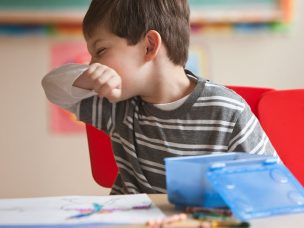Pulmonology
Circadian System Worsens Asthma at Night
This study, published in Proceedings of the National Academy of Sciences, found that the brain’s circadian system plays an important role in the nocturnal worsening of asthma. Dr. Frank Scheer of Brigham and Women’s Hospital in Boston, Dr. Steven Shea of the Oregon Institute of Occupational Health Sciences in Portland, and their team conducted a study on...
Keeping Classrooms Safe for Kids With Asthma, Allergies
Parents of kids with asthma and allergies should prepare a plan to keep them safe as schools reopen, the American College of Allergy, Asthma and Immunology (ACAAI) says. Along with guarding against COVID-19, it’s important to protect against cold, flu and other viruses that pose a risk to children with asthma. That includes wearing masks,...
Lockdowns Cut Air Pollution, But Poorer Neighborhoods Benefited Less
If you thought the air was cleaner at the height of the COVID-19 pandemic, you weren’t imagining it. But clean skies were less evident in poorer areas of the United States, a new study finds. COVID-19 pandemic-related lockdowns reduced overall levels of nitrogen dioxide air pollution in many U.S. cities. However, levels remained higher in...
Americans' Lung Health: The Poor Suffer Most
The health of your lungs may have a lot to do with the size of your bank account, a new, large study indicates. The finding follows a six-decade look at lung disease risk among more than 215,000 American children and adults. In general, poorer Americans continue to have worse lung health than their wealthier peers....
Long-Term Disparities in Respiratory Health Persist in the U.S.
Benefits of improved air quality and reduced smoking have not been equally distributed according to socioeconomic status Income- and education-based disparities in pulmonary health in the United States have persisted and potentially worsened during the past six decades, according to a study published online May 28 in JAMA Internal Medicine. Adam W. Gaffney, M.D., M.P.H.,...
Asthma Flares Down Among Black, Hispanic Patients During Pandemic
There was a substantial decrease in asthma exacerbations among Black and Hispanic patients during the COVID-19 pandemic, according to a study recently published in the Journal of Allergy and Clinical Immunology: In Practice. Justin D. Salciccioli, M.B.B.S., from Brigham and Women’s Hospital in Boston, and colleagues used data from the PREPARE study of reliever-triggered inhaled...
Complementary and Alternative Medicine and Asthma Disparities
Complementary and alternative medicine (CAM) usage has been associated with poor adherence to asthma medications. Previous studies showed inconsistent results due to small sample sizes, demographic differences across populations studied, and poor differentiation of CAM types. This study aimed to provide more robust data on the use of CAM by American adults with asthma. The data...
ICD-Coded Asthma Disparities in Spanish-Preferring Latino Children
Among American children, it is unclear if the disparity in asthma diagnosis among non-Hispanic white and Latino patients exists as a result of diagnostic variation in clinical scenarios that are suggestive of asthma. This study’s goal was to determine the distribution of demographic factors that correlate with asthma diagnosis within the Hispanic American community. This...
Factors Associated With Childhood Asthma Disparities
Among American school-aged children, there is a wide variation in asthma outcomes. This study, published in the Journal of Asthma, aimed to provide a national descriptive profile of asthma outcomes among school-aged children (ages 6 – 17). The researchers looked at both asthma control and treatment patterns. The data for this cross-sectional survey came from the...
More Medical News














